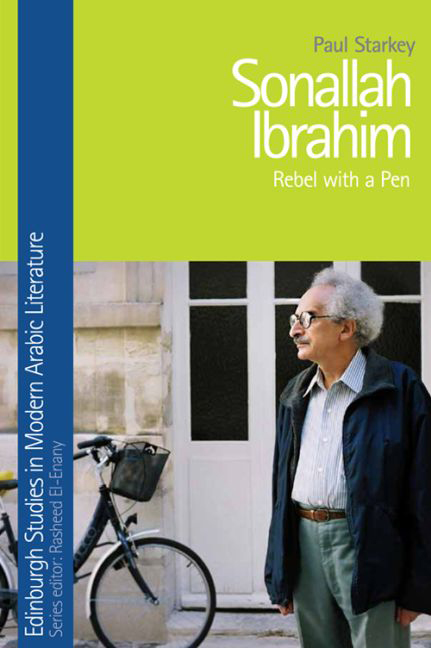Book contents
- Frontmatter
- Contents
- Series Editor's Foreword
- Preface
- 1 Introduction: Background and Context
- 2 Rebel with a Pen
- 3 Cairo Prison: Tilka al-raʾiha (1966)
- 4 Michelangelo and the Dam: Najmat Aghustus (1974)
- 5 CocaColaland: al-Lajna (1981)
- 6 War in Lebanon: Bayrut, Bayrut (1984)
- 7 Consumer Society: Dhat (1992)
- 8 Prison of Dishonour: Sharaf (1997)
- 9 Widening Horizons (1): Sex, Memory and Revolution: Warda (2000)
- 10 Widening Horizons (2): In the Land of the Capitalists: Amrikanli (Amri Kan Li) (2003)
- 11 Return to Childhood: al-Talassus (2007)
- 12 The French Connection: al-ʿImama wa-al-Qubbaʿa (2008) and al-Qanun al-Faransi (2008)
- 13 Filling a Gap: al-Jalid (2011)
- 14 Epilogue
- Bibliography
- Index
1 - Introduction: Background and Context
Published online by Cambridge University Press: 23 September 2017
- Frontmatter
- Contents
- Series Editor's Foreword
- Preface
- 1 Introduction: Background and Context
- 2 Rebel with a Pen
- 3 Cairo Prison: Tilka al-raʾiha (1966)
- 4 Michelangelo and the Dam: Najmat Aghustus (1974)
- 5 CocaColaland: al-Lajna (1981)
- 6 War in Lebanon: Bayrut, Bayrut (1984)
- 7 Consumer Society: Dhat (1992)
- 8 Prison of Dishonour: Sharaf (1997)
- 9 Widening Horizons (1): Sex, Memory and Revolution: Warda (2000)
- 10 Widening Horizons (2): In the Land of the Capitalists: Amrikanli (Amri Kan Li) (2003)
- 11 Return to Childhood: al-Talassus (2007)
- 12 The French Connection: al-ʿImama wa-al-Qubbaʿa (2008) and al-Qanun al-Faransi (2008)
- 13 Filling a Gap: al-Jalid (2011)
- 14 Epilogue
- Bibliography
- Index
Summary
It is something of a truism to observe that the history of modern Egyptian literature, as indeed of modern Arabic literature more generally, has been intimately bound up with political and social developments in the region. General histories of modern Arabic literature traditionally began their accounts of the nah∂a, or ‘revival’, from the politically charged date of 1798, the date of Napoleon's invasion of Egypt, and although more recent critics have been more nuanced in their approach, this date still (rightly) retains a prominent place in most accounts of the Arab literary and cultural revival. During the twentieth century, the 1919 Egyptian revolt against the British occupation provided inspiration for Tawfiq al-Hakim's seminal novel ʿAwdat al-Ruh (Return of the Spirit; 1933), and we can point to a subsequent series of political events that punctuated the region and whose significance is reflected in the works of Arab writers, in both poetry and prose. Of these events, the most significant are perhaps the nakba (the ‘disaster’), the 1948 conflict leading to the founding of the State of Israel, with wide-ranging repercussions through much of the Arab world; the Egyptian Free Officers’ Revolution of 1952, leading to the establishment of the Nasserist regime; and the naksa, the ‘great setback’, embodied in the humiliating defeat of the Arabs in the June (Six-Day) War of 1967, which resulted in a period described by one commentator as one of ‘anguished self-criticism, [and] a searching reappraisal of post-war Arab culture and political practice’. The 1967 War is of particular significance in the present context, for it sparked a new generation of writers, often known as the ‘Generation of the Sixties’ (Jil al-sittinat), who began to react more outspokenly than before, accusing their predecessors of contributing to the defeat by their silence, and embarking on a re-evaluation of literary forms, the role of the writer in society and the representation of reality in fiction. Many of these writers were associated with the short-lived but influential magazine, Gallery 68, published in Egypt between 1968 and 1971, which brought together a number of leading Egyptian and non-Egyptian writers, and although Sonallah Ibrahim did not form part of this group as such, commentators on this critical period frequently cite his short novel Tilka al-Ra ʾiha (first published in 1966) as a seminal work in ushering in the new mood.
- Type
- Chapter
- Information
- Sonallah IbrahimRebel with a Pen, pp. 1 - 16Publisher: Edinburgh University PressPrint publication year: 2016



